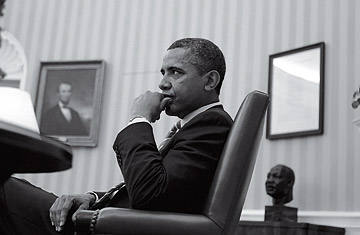
(3 of 7)
The President, on the other hand, came into office with a set of beliefs about the world that he has tried to act upon. Chief among them is that over the past decade, the U.S. has wasted its power and prestige on an intervention in Iraq that he believed was an expensive mistake and a major distraction. In office, Obama stuck to his view despite pressure to do otherwise, and in a disciplined manner, he drew down American forces in Iraq, from 142,000 when he took office to zero as of a few weeks ago. When I asked Obama on the campaign trail in 2008 which President's foreign policy he admired, he immediately chose George H.W. Bush, a President known as a foreign policy realist, whose watchwords were prudence, cost-effectiveness, diplomacy and restraint. James Baker, Bush's Secretary of State, has admitted to approving of Obama's approach to international relations.
In contrast with his policy on Iraq, Obama argued for a buildup of forces in Afghanistan. But even there, he sought to end the more expansive aspects of the mission, focusing the fight on counterterrorism against al-Qaeda and similar groups, whether in Afghanistan, Pakistan or Yemen. The alternative, a war of counterinsurgency in Afghanistan, could easily morph into an open-ended nation-building project in one of the poorest countries in the world. Several Administration officials privately confirm that from the start Obama wanted to pare down the mission in Afghanistan to a fight against terrorist groups. He either was outmaneuvered by the military or decided to accept its advice for a surge. In the end, he acceded to an 18-month buildup to hammer the Taliban into negotiations and announced last June that the U.S. would begin drawing down 10,000 troops in Afghanistan by the end of 2011 and an additional 23,000 by the end of the summer of 2012, leaving 68,000 troops in the country. Meanwhile, he embraced counterterrorism with ferocity, dramatically expanding the campaign of special operations and drone attacks that have since killed most of al-Qaeda's senior leaders--almost all of whom lived in Pakistan. The crowning success of this strategy was the raid on Osama bin Laden's compound in Pakistan and his assassination. (Of course, as with all successful counterterrorism, the strategy seems foolproof in retrospect. Had these various missions failed, had many American soldiers died, those tactics would have been called dangerous and foolhardy.) In the central battle in the war on terrorism, Obama adopted many of the Bush Administration's aggressive tactics, used them more aggressively and achieved greater success. Republicans find it difficult to attack Obama credibly on the core issue of fighting America's enemies because he outflanked them on the right.
